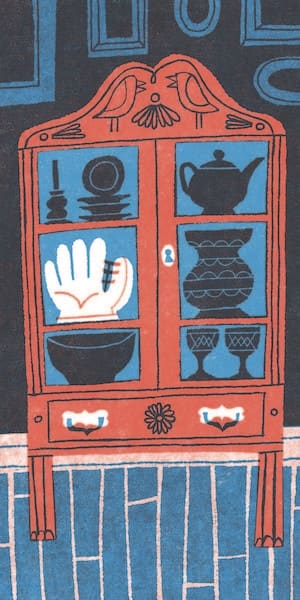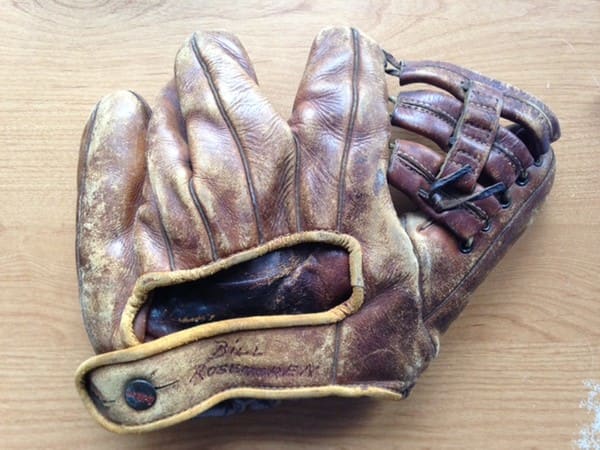Shortly before he died, my dad gave me his baseball glove. It’s one of those big leather blobs with thick fingers, a Wilson model maybe 70 years old. On the band of leather that wrapped around his wrist, my dad had etched his name, BILL ROSENGREN. All caps. The “B” and “R” have the flourish of his creative side (the former Minnesota Daily cartoonist); the other letters display his impeccable penmanship (the dutiful U of M law student). He used a wood burning tool, whose mark would endure longer than a pen’s ink. The glove, worn and aged, has preserved his personality.
I imagine the glove new: dark brown, aromatic leather. My dad, 13, 14 years old, tenderly rubbing oil into the pocket. I picture that boy—the skinny kid with short blond hair I know from black and white photographs—scooping ground balls with that lumpy glove, clapping his free hand over the pocket to trap the ball.
He played in a park near Minnehaha Falls. A road has since erased the field, but his stories about the games linger. My favorite is of the kid who slugged a ball that crashed into the popcorn cart past left field, breaking glass and scattering players—except for the batter, who gleefully rounded the bases before fleeing. I loved the way my dad laughed when he told that story, his eyes crinkling, his complexion reddening.
In another photograph, this one from the early ’50s, my dad poses with his Navy shipmates in baseball uniforms, the glove resting on his knee. He played second base in a tournament against Alaskan teams during his ship’s tour. I hardly recognize the young man—front row, second from the left—with several days’ growth of beard. He was always clean-shaven as my father.
 I marvel that he had lived almost half of his life before I knew him.
I marvel that he had lived almost half of his life before I knew him.
Pondering that glove today, I’m curious about the time he bought it, probably with money from his paper route. Was he one of the first among his buddies to have a glove? One of the last? When someone dies, things we never thought to ask assume a sudden importance and stoke in us a desire to know, as though that knowing would bring the lost one closer to us, would ease the separation brought by death, soften its permanence.
This ache to know our parents often visits us too late. Yet had it come earlier for me, I’m not sure it would have been satisfied. My dad was a difficult man to get to know, a Swede who could go long stretches without speaking. Born in 1934, he was native to a generation of men who did not discuss their emotions. He shared some memories, but not about his father who disappeared on drinking binges; not about his mother, bitterly working to pay her husband’s gambling debts. So often, that’s the way it is. We’re left with a view from the outside wishing we could know what it was like inside.
Today, I pick the glove off the shelf and slide my hand into it. Part of the beauty of an old leather glove is the way it shapes to one’s hand, formed by so many days of sunshine and sweat. The glove does not fit me the way it did my dad. It’s stiff in places, short in the fingers, wide in the palm.
I’m surprised to feel deep inside the fingers the leather has broken open and the ragged edges chafe my skin. The exposed padding is soft, tender. It seems I have stumbled upon a secret, something intimate I had not known. Maybe my dad knew I would, and this was his way of letting me glimpse what it had been like to be him.
© John Rosengren
